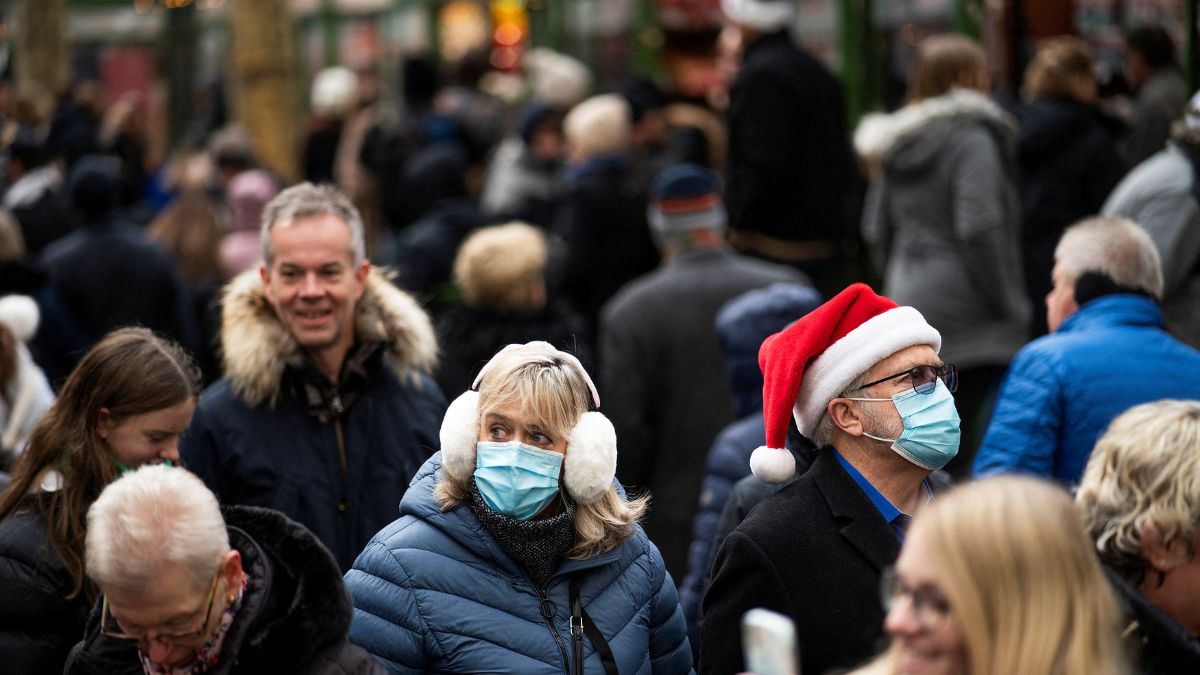The US and UK are battling a ‘quad-demic’ as COVID-19, flu, RSV, and norovirus converge, overwhelming healthcare systems. Hospitals face record admissions, with paediatric wards and emergency rooms stretched thin. Experts urge vaccinations, hygiene measures, and vigilance to curb the viral surge
read more
The term “quad-demic” refers to the simultaneous surge of four major viruses — COVID-19, flu, respiratory syncytial virus (RSV), and norovirus — currently placing immense pressure on healthcare systems in the United States and the United Kingdom.
These illnesses, common in winter months, are spreading at unprecedented levels this season, sparking concerns among public health officials.
Dr. David Lloyd, an NHS GP, told Sky News, “The risk and complication rate of people catching all four of these illnesses at once heightens at this time of the year, hence the term.”
The viruses behind the Quad-demic
COVID-19: Despite widespread vaccinations and immunity from past infections, COVID-19 continues to pose challenges, particularly with the emergence of new variants.
The combination of weakened immunity and holiday gatherings has fuelled a resurgence in cases, with hospitals already reporting thousands of related admissions.
Flu: Flu activity has surged dramatically this winter, with the UK reporting a 352 per cent increase in hospitalisations compared to December 2023.
Similarly, the US is experiencing widespread flu activity, with millions affected. Vulnerable groups, including children and the elderly, are at heightened risk of severe outcomes.
RSV: RSV, a common virus that can cause severe respiratory infections in infants, the elderly, and immunocompromised individuals, is contributing to overcrowded paediatric hospitals.
Vaccines for RSV, recently rolled out for certain vulnerable populations, are expected to help reduce hospitalisations but remain underutilised.
Norovirus: Known as the “stomach bug,” norovirus causes gastrointestinal distress, including vomiting and diarrhea. It is highly contagious, spreading rapidly in close-contact settings like schools and hospitals.
WTAE-TV quoted Dr. Joseph Aracri of Allegheny Health Network who described the situation as “a bunch of puking kids,” highlighting its contagious nature.
Why are these viruses surging simultaneously?
Several factors contribute to the quad-demic:
-
Seasonal patterns: Cold, dry winter air facilitates virus survival and spread.
-
Pandemic legacy: Reduced exposure to viruses during COVID-19 lockdowns has led to lower immunity in many populations.
-
Increased interaction: Holiday gatherings, travel, and the return to work and school environments have accelerated transmission.
How healthcare systems are under strain
Healthcare systems in both the US and UK are being severely tested by the quad-demic, with hospitals reporting alarming statistics that reflect the strain on resources:
-
In the UK, hospitalisations due to flu reached an average of 1,861 patients per day in the first week of December 2024 — a staggering 70 per cent increase from the previous week and more than three times higher than the same period last year.
-
Norovirus cases are also up by 10 per cent compared to the prior week and 64 per cent higher than in December 2023.
-
RSV hospitalisations have been particularly concerning, with 152 children admitted daily in the UK, compared to 107 during the same period last year.
-
In the US, norovirus outbreaks have risen to their highest levels since 2012. RSV hospitalisations increased by nearly 40 per cent over two weeks, with paediatric hospitals experiencing overcrowding.
-
The Centers for Disease Control and Prevention (CDC) estimates that flu has already affected 3.1 million Americans, resulting in 37,000 hospitalisations and 1,500 deaths by early January 2025.
To cope with the surge, hospitals are taking extraordinary measures. Some US healthcare facilities, particularly in Wisconsin, New Jersey, and California, have reinstated mask mandates for staff and visitors. Additionally, there are reports of hospitals delaying elective procedures to prioritise care for critically ill patients.
The UK’s National Health Service (NHS) has issued a stark warning about its capacity to handle the winter pressures, with flu, COVID-19, RSV, and norovirus stretching its already fragile resources.
Patients have reported long wait times for appointments and emergency care, and delays in RSV vaccine rollouts have left some vulnerable groups unprotected.
How to protect yourself
Experts unanimously recommend vaccination as the first line of defense. Flu, COVID-19, and RSV vaccines are widely available for eligible individuals, while good hygiene practices remain essential for preventing norovirus.
Dr. Robert Hopkins Jr., medical director of the National Foundation for Infectious Diseases, told Fortune, “If you haven’t been vaccinated and you’re eligible, get that COVID shot, get that flu shot.”
Additional preventive measures include:
-
Frequent handwashing, especially before eating or preparing food.
-
Wearing masks in crowded or indoor settings.
-
Staying home when sick to prevent spreading illnesses to others.
Vaccinations, public awareness, and robust healthcare strategies will be critical in navigating this challenging winter.
With inputs from agencies


)
